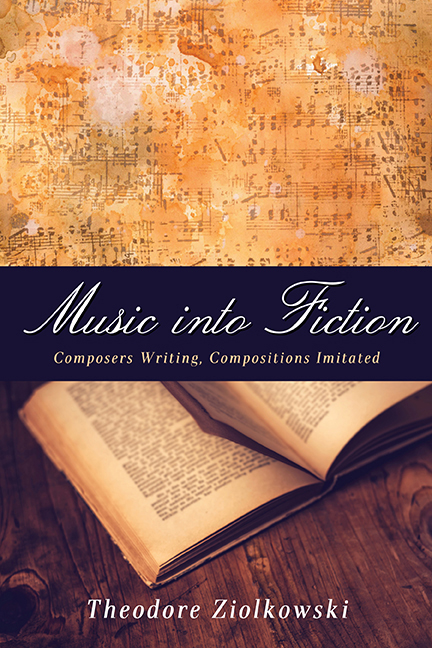Book contents
- Frontmatter
- Dedication
- Contents
- Preface
- Prelude: Introduction
- First Movement: Composers Writing
- 1 Weber and Hoffmann
- 2 Berlioz and Schumann
- 3 Wagner
- 4 Transition: Nietzsche and the Post-Wagnerians
- 5 Burgess
- Second Movement: Compositions Imitated
- Finale: Composers Setting Fictional Compositions
- Coda: Conclusion
- Bibliography
- Index
4 - Transition: Nietzsche and the Post-Wagnerians
from First Movement: Composers Writing
Published online by Cambridge University Press: 09 May 2017
- Frontmatter
- Dedication
- Contents
- Preface
- Prelude: Introduction
- First Movement: Composers Writing
- 1 Weber and Hoffmann
- 2 Berlioz and Schumann
- 3 Wagner
- 4 Transition: Nietzsche and the Post-Wagnerians
- 5 Burgess
- Second Movement: Compositions Imitated
- Finale: Composers Setting Fictional Compositions
- Coda: Conclusion
- Bibliography
- Index
Summary
Nietzsche
It was Parsifal that finalized Nietzsche's break with his once-venerated friend Richard Wagner, following a decade of gradual disillusionment. “Parsifal is a work of guile, of vengefulness, of stealthy poison-blending against the premises of life, a bad work,” he wrote in his diatribe Nietzsche contra Wagner (1888).
Friedrich Nietzsche (1844–1900) was passionately devoted to music, which provides a leitmotif throughout his oeuvre. His early classic, Die Geburt der Tragödie (The Birth of Tragedy, 1872) famously bears the subtitle Aus dem Geiste der Musik (From the Spirit of Music). He argues there that “melody generates poetry from within itself ” (41), that “tragedy arose from the tragic chorus and was originally only chorus and nothing but chorus” (44), and that the chorus was “at its primitive stage in ur-tragedy a self-mirroring of Dionysian man” (51). Accordingly, he defines Greek tragedy as “the Dionysian chorus that releases itself ever again anew in an Apollonian world of images” (52). That process gives him hope for a rebirth of the German spirit from its own Dionysian roots—a rebirth that can already be detected in German music “in its mighty solar orbit from Bach to Beethoven, von Beethoven to Wagner” (109).
Nietzsche dedicated his treatise to Wagner, whom he met in 1868 and whose work he appraised in several sections added to the original version. In Wagner's operas he saw a form analogous to original Greek tragedy, where music—the chorus—was still primary. “Music is the actual idea of the world; drama is only a reflection of that idea, its isolated shadow image” (119). He elaborated that view in the fourth of his Unzeitgemässe Betrachtungen (Untimely Meditations), a paean titled Richard Wagner in Bayreuth (1876). There he tries to explain the critical opposition to Wagner by saying that “a musician who writes and thinks seemed at that time preposterous to the world” (407). “The poetic in Wagner reveals itself in the fact that he thinks in visible and perceptible events, not in concepts: that is, he thinks mythically, just as the Volk (ordinary people) has always thought” (413).
- Type
- Chapter
- Information
- Music into FictionComposers Writing, Compositions Imitated, pp. 83 - 110Publisher: Boydell & BrewerPrint publication year: 2017

